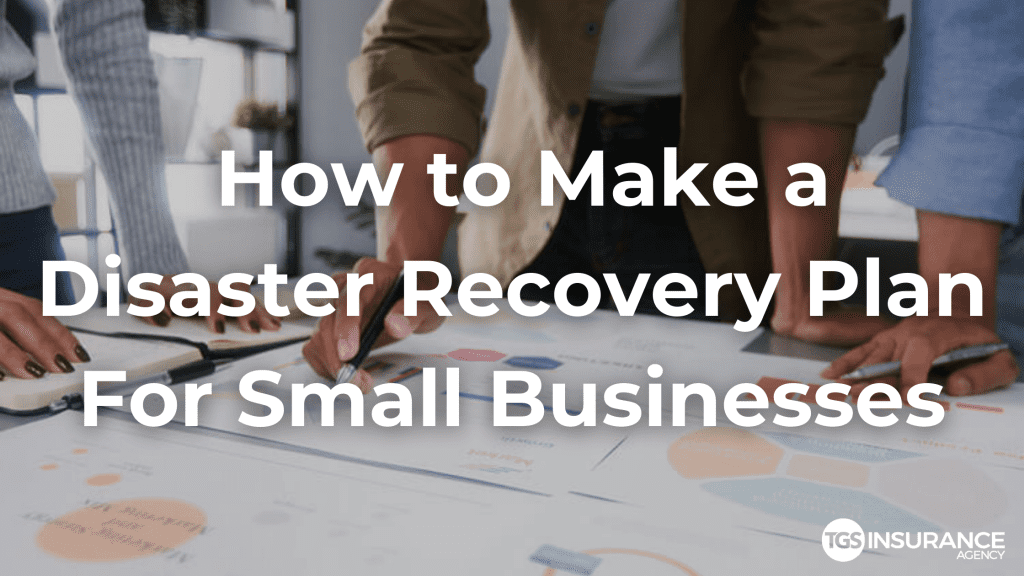
There’s nothing more disheartening than working hard to establish your small business, only to see forces out of your control, such as a hurricane, fire, or theft, suddenly put a halt in your business operations. What’s worse, disasters can have a devastating impact on small businesses, forcing some to close down for good. According to FEMA, between 40-60% of small businesses that suffer a disaster never open back up for business again.
While most disasters are unavoidable, creating a disaster recovery plan can help small business owners minimize loss. Consider taking the following steps to prevent a business-breaking catastrophe:
Key Elements of a Business Recovery Plan
- Develop an emergency response plan and train your employees on how to execute it. Be sure your employees understand who to contact in the event of a disaster and what preventive measures to take to protect themselves and limit as much property loss as possible.
- Write out a step-by-step plan and delegate responsibilities to employees clearly. It might seem silly, but practicing the procedures in your emergency response plan with regular drills can help everyone know what to do in a real-life situation and minimize confusion.
- Create a list of important phone numbers and addresses. Make sure you can get in contact with key people after a disaster happens. This list should include your employees, local and state emergency agencies, important clients, suppliers, financial institutions, and insurance provider claims representatives.
- Develop a communication strategy to avoid losing customers. You can do so by hanging notices on your front doors, posting on your social media accounts, or contacting customers personally through phone or email.
- Consider the items you need during an emergency. These items might be an emergency supply kit or a backup source of electricity and communications system.
- Human resources. Protecting your employees and customers from injury in your place of business is most important. Take into consideration the possible repercussions a disaster will have on your employees’ ability to get to work. You may also want to consider how your customers can receive products or services to maintain business.
- Business community. If your business is lucky enough to dodge a disaster, there is still a potential risk that you could experience major losses due to a lack of supply chain and the ability for products to be delivered. Communicate with your suppliers about your disaster recovery plan, so everyone is prepared and on the same page.
- Identify the activities and supplies needed to maintain your business. If shutting down your business is not financially an option, then you need to determine what your business requires to operate in a different location.
- Back-up your data. Regularly back up your business’s data and information on a cloud-based system. Be sure to keep copies of important documents in a safe deposit box and double-check to see if everything is up-to-date. You want to make sure important information and documents are located in a safe and dry place.
- Protect the structure of your building. If you own the structure that your business resides in, integrate a plan to protect the windows and doors in the event a hurricane is going to strike in your area. Make sure that no electronics are near the ground, as with hurricanes means there’s a good possibility of flooding.
Review Your Insurance Policy
Now is the time to review your insurance policy to make sure you have enough coverage to protect the disruption of your business, the structure of the building where your business operates out of, as well as the costs to completely rebuild, should you need to. Most insurance policies don’t include coverage for flooding or earthquakes, so you should purchase separate policies to ensure you’re protected from those perils. Be sure that you fully understand your policy deductibles and coverage limits, so you aren’t left with any surprises.
When it comes to destruction to a business, the loss can go beyond the physical damage to the premises, furniture, equipment, and other items you use to operate your business. Small business owners run the risk of losing their source of income while their premises are not usable. Reviewing your insurance policy can help you see if you have any coverage gaps and add protection where it’s needed.
At TGS Insurance, we provide commercial property insurance to ensure our small business owners have the coverage they need. We understand how hard you work to establish your business, and we want to ensure you have the best of the best coverage for the lowest price on the market. From our bank of over 35+ providers, our agents will find you a policy that is tailored to your needs and budget. We will walk you through the entire process and handle everything from start to finish. Our agents strive to provide an exceptional customer service experience and ensure you have a hassle-free buying experience. Contact us today to get your commercial insurance policy started!
Source: Insurance Information Institute